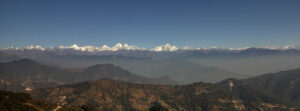It took a bit of time to collect all the players and load the additional equipment at different locations in Kathmandu, but we headed for Chisapani by 6am. It was a good run, and the mountains were out in all their glory to remind me what an amazing location all this is taking place in….read more
Chisipani - an outreach program in Nepal
It was February 2020 and the news of a new virus was raising concerns. At that time however things were not so widespread so we at the Himalayan Health Project (HHP) were optimistic about the medical outreach program we had planned in Nepal and decided to go ahead with it.We didn't expect it to become the Covid19 pandemic it now is.
This was my first time in Kathmandu and contrary to my expectations, this was a city almost as busy as Mumbai. But the chaos was compensated by the majestic Himalayas surrounding the city.
Our medical outreach program was to happen at Chisipani, which is a drive through a treacherous route, 3 hours from Kathmandu. This tiny village was devastated during the 2015 earthquake. HHP through the various international students and volunteers that visited Chisipani helped build a community center and toilets that act as a safe space in case of further disasters. It also acts as a center for us to conduct our health outreach programs.
My biggest learning from my previous projects working with the Himalayan Health Project in Ladakh, India was to always expect the unexpected. Your expectations will almost always be proven wrong. If one day would have too many people to handle, the other day would have barely any. One day things would move super fast and sometimes they would barely move. But when you’re ready to be surprised, one doesn’t get bogged down by these googlies.
Asking someone to open their mouths to an absolute stranger, as you would assume, isn’t the most comfortable thing for anyone. Especially if that someone isn’t from your language or culture. Which is why it’s always a great idea to get the local dentists and health care workers involved to help understand the oral health and problems faced by the community, and identify what we need to work on, and how to help them sustain and maintain care. Which is where Dr. Shrestha and her experienced team of assistants and associate dentists fit in. She runs her own private practice in Kathmandu and has been practicing there for the past 13 years. Which helped with the locals getting comfortable.
Our objective in Chisipani was to triage the entire village and people from the neighborhood for dental and vision abnormalities. Because of the lack of facilities for primary health care in the village we were expecting to see a lot of people. The lack of education of oral hygiene and regular check-ups majority of the population had moderate to severe dental problems. Dr. Shrestha,and her associates joined me to form a team that checked close to 150 patients in a single day for dental problems.
At the project we have always believed that triaging without offering solutions for treatment is essentially a useless exercise. But with limited electricity and portable dental equipment, treatment in Chispani this time was difficult. So we brought the patients to Dr. Shreshta’s clinic in Kathmandu for treatment.
This day was the first in many more programs that are to come. We hope to uplift the community by encouraging them to follow good oral hygiene practices to reduce the need for treatment in the future.
